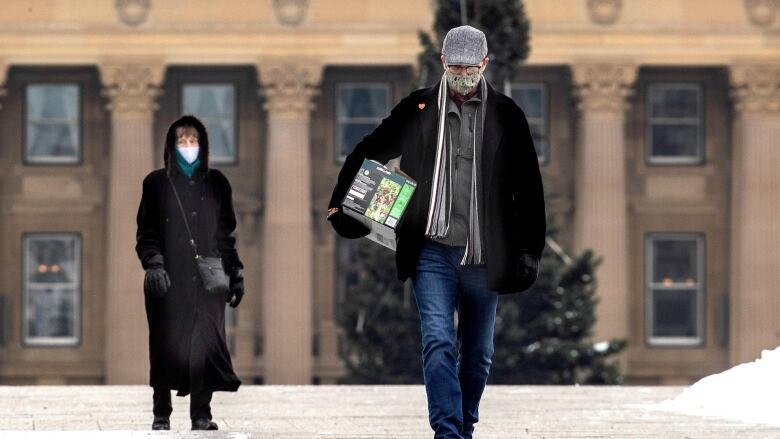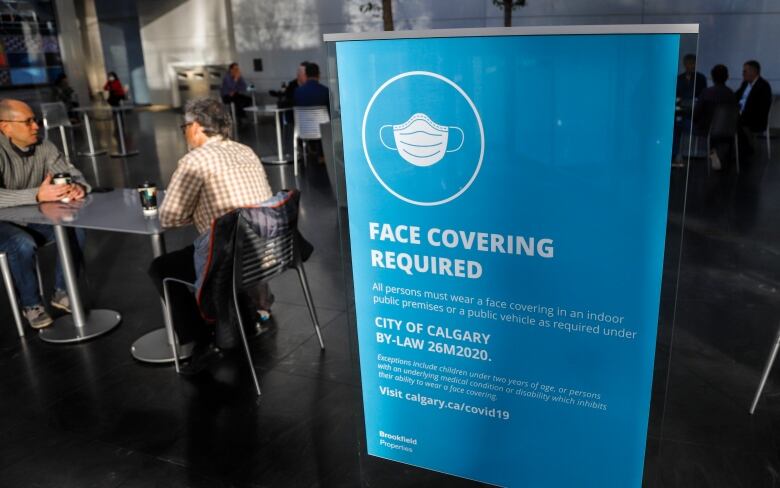Alberta has new COVID-19 measures on gatherings and businesses. Here's what has changed.
In communities with enhanced COVID-19 status, many businesses will be closed or restricted

With Alberta's bevy on new restrictions on social gatherings, church services and businesses, it can be difficult to keep track of what has changed and what hasn't.
Here's a breakdown of the new measures and how the province's approach has changed in recent weeks.
Business changes
Starting on Friday in communities with enhanced COVID-19 status, many businesses will be closed or restricted.
Unlike in the spring when the province designated essential and non-essential businesses, this time most businesses are placed into three main categories: closed for in-person service, open with restrictions and open by appointment only.
Banquet halls, concert venues, community centres and children's play places will all need to close for the three-week duration.
All levels of sports will also be cancelled during the restriction period, though the province may grant exemptions.
Recreational sport and group fitness activities were already paused in the Edmonton region, Calgary region, Grande Prairie, Lethbridge, Fort McMurray and Red Deer when the premier announced restrictions on Nov. 12.
Other businesses in the now-closed category were allowed to operate with health measures in place, with mostreopening June 12 under the province's Stage 2 relaunch.
Businesses that are now appointment-only include salons, barber shops, personal services like esthetics, wellness services like esthetics, professional services like lawyers and accountants and hotel/lodging businesses.
Barber shops and salons were among the first to close during the early pandemic in Alberta, but also among the first to reopen, starting in May. However, now they will need to operate without walk-in services.
Wellness services were already advised to discourage walk-in services and have clients book appointments online or by phone, as were personal services.
Businesses in the appointment-only category are also advised to consider virtual options where possible, which could apply to some professional services and private one-on-one lessons.
Businesses that are open with a capacity limited to 25 per cent includeretail stores, pharmacies, and libraries.
WATCH | Alberta premier announces new restrictions Monday
Indoor fitness centresincluding dance and yoga studios, martial arts, gymnastics and pools can also operate with 25-per-cent capacity, but only forindividual studio time, training or exercise. No team or group fitness is allowed.
Bingo halls and casinos were also open in Stage 2, though casinos were not allowed table games until September. Table games are not allowed under the current restrictions and both casinos and bingo halls are limited to 25-per-cent capacity.
Restaurants and pubs have been operating without a cap onthe number of people starting with the Stage 2 relaunch.
Under the restrictions announced Nov.12, liquor could only be served at restaurants and pubs until 10 p.m., and the businesses had to close by 11. That restriction has been extended, though the province has clarified casinos aren't required to close by 11.
Previously, in-person dining was allowed within cohorts. But the province is now only allowing people from the same household to eat together at restaurants. The number of people at one table is also capped at six.
Cohort bubble burst?
Cohort groups, bubbles or families have been a part of Alberta's COVID-19 strategy since the spring. In essence, it's a small group of people who may not all live in the same household but can interact with each other without having to keep a two-metre distance.
There were also larger cohorts for schools, sports teams, or performers. Depending on the type of cohort, different rules applied in terms of restrictions.

But the province's new restrictions have put a pause on most cohort groups. Social gatherings are restricted to the members of a household, which excludes cohort families. Sports have been paused until mid-December so those cohorts are also on hold. School cohorts will continue for some grades, but students in Grades 7-12 will soon be shifting to online learning.
Although cohorts aren't permitted, people who live alone can have up to two non-household contacts during the restriction period.
Social gatherings
Indoor social gatherings are now banned in the whole province. Both Premier Jason Kenney and Dr. Deena Hinshaw, the chief medical officer of health, have pointed to that type of gathering as main source of COVID-19 spread in the province.
The new measures follow a series of restrictions on gatherings that began last month
On Oct. 8, Hinshaw recommended all private gatherings in Edmonton be limited to 15 people and that people should reduce their cohorts to no more than three.
That restriction was voluntary but became mandatory near the end of October and expanded to include Calgary. All social gatherings were to have a limit of 15 people, though that does not apply to "structured events," including restaurant dining, wedding ceremonies and trade shows.
On Nov. 6, Kenney encouraged Albertans, especially those in the two largest cities, to stop holding at-home social gatherings, though it was not a mandatory restriction. That same day the province opted to limit social gatherings to 15 people in areas of the province under a watch or enhanced status, not just in Edmonton and Calgary.
Six days later, Kenney encouraged all Albertans in enhanced regions to stop having social gatherings in their homes.
Now, the province has formally banned indoor social gatherings with a promise to enforce the order. Outdoor gatherings are also limited to 10 people. Those who violate the restrictions could face $1,000 fines.
"If you're holding indoor social events, they're now illegal," Kenney said on Tuesday. "That's pretty astonishing. And those rules will be enforced to our greatest ability."
Kenney also made sure to distinguish that a family eating at a restaurant is not the same as a social gathering, even if it is indoors, reiterating that only members of the same household are allowed to dine together.
Hinshaw clarified Tuesday that services such as babysitting or home care are also not considered social gatherings.
Other measures
Weddings and funerals have had a plethora of shifting rules, depending on whether events were indoors or outdoors, a reception or a ceremony, and at timeswhere the event was held.
The rules are fairly simple now: No receptions are permitted and wedding ceremonies and funerals are capped at 10 people, regardless of whether they are held inside or out. The 10-person limit includes the officiant, bride and groom and witnesses, but does not include staff, who are not considered to be invited guests.
Religious servicesalso have new restrictions for enhanced areas: alimit of one third capacity. This measure was previously voluntary and was already being followed by most groups, Kenney said.
As of Tuesday, the province has also mandated masks in Edmonton and Calgary in all indoor workplaces. Both cities already have mask bylaws in place, though the new measure applies to surrounding areas as well.
The current mask mandate complements the municipal ones, which focus on masking in public spaces, said Tom McMillian, assistant director of communications for Alberta Health. Those bylaws donot include all indoor workplaces, where masks have now been made mandatory.













_(720p).jpg)


 OFFICIAL HD MUSIC VIDEO.jpg)
.jpg)



























































































